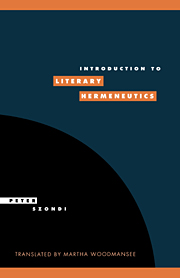Book contents
- Frontmatter
- Contents
- Foreword by Joel Weinsheimer
- Translator's preface
- Chapter 1 Introduction
- Chapter 2 Chladenius, I
- Chapter 3 Chladenius, II
- Chapter 4 Chladenius, III
- Chapter 5 Chladenius, IV
- Chapter 6 Meier, I
- Chapter 7 Meier, II
- Chapter 8 Ast
- Chapter 9 Schleiermacher, I
- Chapter 10 Schleiermacher, II
- Afterword by Jean Bollack
- Index
Chapter 7 - Meier, II
Published online by Cambridge University Press: 14 December 2009
- Frontmatter
- Contents
- Foreword by Joel Weinsheimer
- Translator's preface
- Chapter 1 Introduction
- Chapter 2 Chladenius, I
- Chapter 3 Chladenius, II
- Chapter 4 Chladenius, III
- Chapter 5 Chladenius, IV
- Chapter 6 Meier, I
- Chapter 7 Meier, II
- Chapter 8 Ast
- Chapter 9 Schleiermacher, I
- Chapter 10 Schleiermacher, II
- Afterword by Jean Bollack
- Index
Summary
As the class of signs includes, besides artificial signs – which alone we would call signs today – natural signs as well, that is, everything that exists in the world, and as the connection which governs them, according to Meier, is one of sign and signified, the interpretatio scriptorum becomes a special case of interpretatio naturae. The interpretation of literary works is governed by the law of hermeneutic fairness just as is the interpretation of the creation by the law of hermeneutic reverence for God. Fairness is distinguished from reverence in that it does not require us to believe in the perfections of work and author – by contrast with those of creation and creator – but only to regard them as given until proven otherwise. For the rules of secular hermeneutics – whose opposite was now no longer biblical exegesis but interpretatio naturae in the Baroque sense (Leibniz, upon whom Meier builds, can certainly be considered a philosopher of the Baroque) – there are two chief consequences of the postulate of hermeneutic fairness which allow us to measure the influence of this postulate: (1) recourse to the author in interpretation; and (2) a hierarchy of the different sensus – i.e., of proper and improper meaning as well as of straightforward and mediated meaning.
Recourse to the author is not something which would uniquely characterize Meier's hermeneutics. In its origins in antiquity interpretation aimed at determining the author's meaning.
- Type
- Chapter
- Information
- Introduction to Literary Hermeneutics , pp. 80 - 93Publisher: Cambridge University PressPrint publication year: 1995



